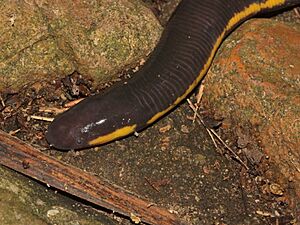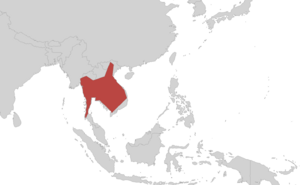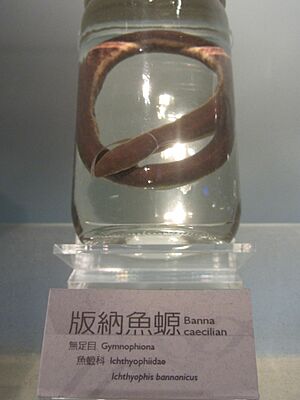Koh Tao Island caecilian facts for kids
The Koh Tao Island caecilian (scientific name: Ichthyophis kohtaoensis) is a fascinating type of amphibian. It belongs to the family Ichthyophiidae. You can find this unique creature in several countries in Southeast Asia. These include Cambodia, Laos, Myanmar, Thailand, and Vietnam.
This caecilian is also known by another name: the Ichthyophis bannanicus, or the Banna caecilian. This name comes from the Banna region in southern China, where it also lives. The scientific name kohtaoensis refers to Ko Tao Island. This island is in the Gulf of Siam, where the first example of this species was found.
Quick facts for kids Koh Tao Island caecilian |
|
|---|---|
 |
|
| Conservation status | |
| Scientific classification | |
| Genus: |
Ichthyophis
|
| Species: |
kohtaoensis
|
 |
|
| Koh Tao Island caecilian range | |
| Synonyms | |
|
Ichthyophis bannanicus Yang, 1984 |
|
Where They Live: Habitats
The Koh Tao Island caecilian lives in many different places. These are called its natural habitats. They prefer warm, wet areas. You can find them in tropical lowland forests. They also live in moist montane forests, which are forests on mountains.
They are often found near water. This includes rivers and swamps. They also live in freshwater marshes. Sometimes, these rivers and marshes dry up for a while. Caecilians can still survive there. They are quite adaptable.
These animals can even live near people. They are found in plantations and rural gardens. Some even live in urban areas. They can also be found in areas where forests have been cut down. Irrigated land and flooded farms are also places they call home. Sadly, their homes are shrinking. They are threatened by habitat loss.
Understanding Their Genetics
Scientists study the genetics of animals. This helps them learn how living things are made. The Koh Tao caecilian has a special set of instructions. These instructions are called chromosomes. Both male and female Koh Tao caecilians have 21 pairs of chromosomes.
Scientists have studied these chromosomes closely. They found that the Ichthyophis genus is very stable. This means that the number of chromosomes usually stays the same. It helps scientists understand how these amphibians are related. It also shows how they have changed over time.



